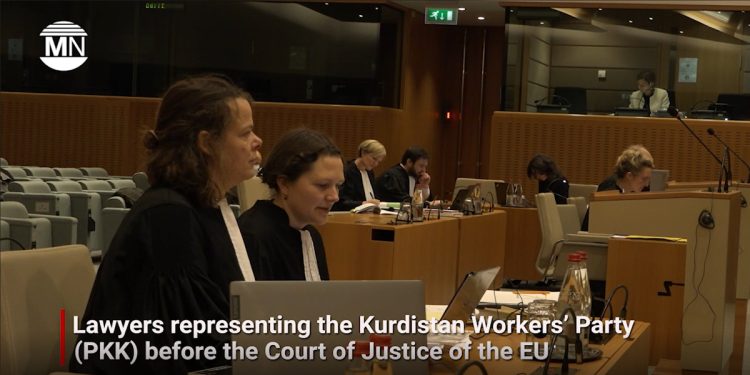CENTRAL NEWS – Lawyers representing the Kurdistan Workers’ Party (PKK) before the Court of Justice of the European Union (CJEU) are cautiously optimistic after a March 31st hearing in a case that could decide whether the group will remain on European terror lists.
The PKK has been designated as a terrorist organization by the European Union since 2002, by the United Kingdom since 2000, and by the United States since 1997. Kurdish communities have long argued that these designations are based on politics, not law or facts on the ground. A growing number of activists, researchers, and policy analysts have echoed this sentiment in recent years as the PKK played a central role in defeating ISIS in Syria and Iraq and proved its willingness to sit down with the Turkish government and negotiate.
The final verdict in the current CJEU case, which deals with the PKK’s designation after the year 2018, is expected in about seven months. In a related case in 2018, the court ruled that the PKK was wrongly included on EU terrorism lists between 2014 and 2017.
Lawyer Tamara Buruma, part of the legal team representing the PKK, said she was ‘pleasantly surprised’ by the content of Thursday’s hearing.
“We felt that the court was very interested in the case and asked some very useful questions also to clarify the statements made by us. It has been a very long case, and a lot has happened in the jurisprudence of the court since the beginning of this case so it was very important to discuss where we stand today,” she explained in a press conference with Kurdish media held after the hearing.
“I was particularly pleased by the way that the court also very much focused on the specific situation of self determination and of the manner in which the Council [of the European Union], for example, considers the PKK,” Buruma added.
Another lawyer working on the case, Marieke van Eik, noted that the judge had brought up the EU’s failure to implement the 2018 decision and its use of the same arguments to continue to list the PKK in 2019 and beyond.
“The [representative of the] Council actually agreed that what they should have done is something different, or [that they] should have asked [for] a substantive measure with the highest court,” she said.
“I think that was one of the issues that the Court really had an issue with, was that indeed even though the Court in 2018 said the decision is insufficiently reasoned, in 2019 the Council copy-pasted it,” Buruma said of the EU’s continuing use of justifications invalidated by the 2018 ruling. Obviously, we are still discussing whether or not those decisions in 2015 and onwards were correct. The fact that they were copy-pasted afterwards means that that discussion also applies to the 2019 decisions. I think it was very clear.”
According to Buruma, the Council of the EU has argued that the PKK cannot be delisted without a peace settlement. Her team, in turn, argues that such a stipulation is “unfair” due to the Turkish government’s active refusal to engage and notes the fact that the PKK “is very much trying to achieve that peace” despite said Turkish intransigence. Terrorism designations prevent governments from being able to engage with listed organizations, making diplomacy involving conflicts in which such groups are involved more difficult. The lack of an outside mediator with the capability to hold both sides to their commitments is seen by many as one of the reasons why the most recent round of peace between Turkey and the PKK failed.




